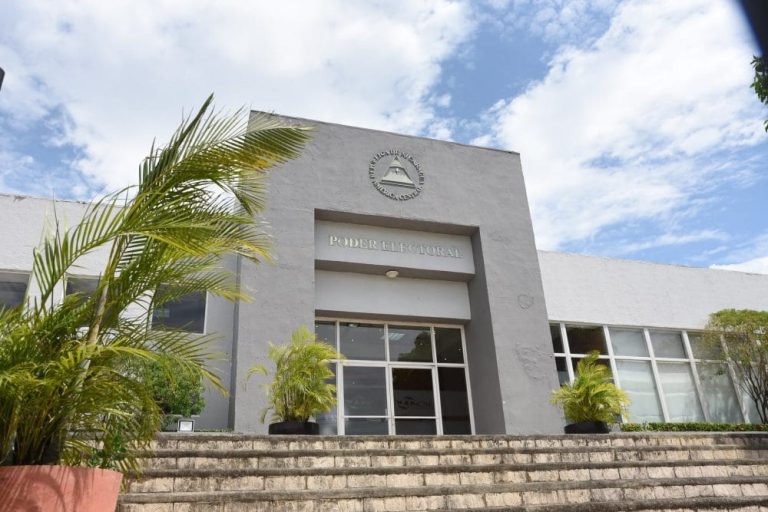1 de junio 2021

Children of Exile: The Births “Sowing Hope” in the Camp of Nicaraguan Farmers

PUBLICIDAD 1M
PUBLICIDAD 4D
PUBLICIDAD 5D
Instead of taking the resolution into account, the Ortega regime promoted tailor-made reforms to further control the elections

Instead of taking the resolution into account
On May 31, expired the latest deadline granted by the Organization of American States (OAS), to the Government of Daniel Ortega and Rosario Murillo, to ensure electoral reforms, “significant and consistent with applicable international standards”, for the electoral process that culminates in November.
In October of last year, the OAS General Assembly approved a Resolution urging the “restoration of democratic institutions and respect for human rights in Nicaragua through free and fair elections,” and offered its “technical assistance for its implementation, to promote free and fair elections.”
None of that happened. Instead, Ortega prompted the National Assembly to approve a counter-reform with which he extended and increased his control over the Supreme Electoral Council, appointing ten magistrates aligned to the ruling party.
Concurrently, he cancelled the legal status of the Democratic Restoration Party (PRD) and the Conservative Party, while conducting a sudden investigation into the presidential candidate, Cristiana Chamorro, accusing her of money laundering.
Former ambassador Mauricio Díaz said what happened proves that Ortega “doesn’t care” what the international community has to say, both bilaterally and multilaterally. “He is also indifferent to what Nicaraguans’ request.” His colleague, former Foreign Minister Francisco Aguirre Sacasa, notes, “whoever is depending exclusively on the international community, is doomed to fail.”
“The international community is very clear that the electoral fraud began in Nicaragua, from the moment that the dictatorship directed all its ammunition to destroy a segment of the opposition,” said Suyen Barahona, president of the UNAMOS party.
Numerous voices have been raised warning about the path to catastrophe that the Nicaraguan electoral process is taking, and of the risk that this implies for the entire nation.
“The dissolution of political parties and the opening of criminal investigations that could lead to the disqualification of candidacies, without due process, not only undermines the political rights of the people who aspire to be elected, but also the rights of the voters to choose the candidates of their choice,” said Marta Hurtado, spokeswoman for the United Nations High Commissioner for Human Rights, from Geneva.
Meanwhile, Ned Price, spokesperson of the US State Department, said that the government of his country “is deeply concerned that the Government of Nicaragua has rejected the calls of its own citizens and the international community, including the OAS, the European Union and the United Nations, to build confidence in the electoral process, by passing significant reforms to allow free and fair elections in November.”
“The international community is in debt with the Nicaraguan people,” assures Aguirre Sacasa, when considering that “we have been talking about the importance of re-democratizing Nicaragua for three years.”
“May was the month that a free, transparent, observed and fair elections were going to be channeled, but there has been no progress. That is why I have no greater expectations of the OAS,” he added.
Diaz sees it differently. The former diplomat and legislator told Confidencial that “the least I expect from (Luis) Almagro, (Secretary General of the continental organization), is to convene a meeting of the OAS Permanent Council.”
Almagro should call the foreign ministers to an emergency consultation meeting, similar to the one that took place in 1978 or 1979, when Jimmy Carter was president in the United States, thinks Diaz, holding on to the hope that this time the votes are there from the Caribbean countries, which seem to be adopting a different attitude.
“Almagro must put the system to the test,” he concluded.
By ignoring the resolution of the continental General Assembly, “Ortega is not only challenging the hemispheric body, in its Constitutive Charter and in the Democratic Charter. He is also challenging the UN High Commissioner for Human Rights, to whom he is saying ‘I am the one in command, because I have the power via the Police, the Army, and the paramilitary,’ etc.”
According to Barahona, from Unamos, “Ortega knows that we can defeat him, and that is why he carries out this repressive onslaught. He is afraid, and that is why he is using what he still has left, which is repression, to frighten, to demoralize, to make us believe that he is strong, but he is not.”
While the international community continues to embrace the cause of the Nicaraguan people from outside, what citizens must do is “to continue in resistance from all corners, using the most creative ways to continue challenging the Ortega-Murillo regime, because those of us who repudiate this dictatorship are a majority,” says Barahona.
Aguirre Sacasa insisted on his skepticism, recalling that “there have been many tweets, many verbal threats, but the OAS is paralyzed by what is happening in Colombia; the serious problem that Nayib Bukele has posed to them in El Salvador; and Juan Orlando Hernandez in Honduras, while in Venezuela we see practically zero progress, although they are beginning to talk about a dialogue.”
“The tragedy about this,” says Diaz, is that “the international community is asking for more actions within the country, but how are we going to do that, if we are under a regime that uses force in this way?”
Looking ahead, Diaz says he doesn’t see any realistic combination of factors that could lead to a fairly decent election on November 7.
This article was originally published in Spanish in Confidencial and translated by Havana Times
Archivado como:
PUBLICIDAD 3M
PUBLICIDAD 3D